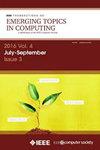利用实体信息对事件知识图进行鲁棒预测
IF 5.4
2区 计算机科学
Q1 COMPUTER SCIENCE, INFORMATION SYSTEMS
IEEE Transactions on Emerging Topics in Computing
Pub Date : 2025-01-31
DOI:10.1109/TETC.2025.3534243
引用次数: 0
摘要
脚本事件预测是根据已经发生的事件序列预测后续事件的任务。它有利于以事件为中心的系统(包括企业系统、物联网系统等)的任务规划和流程调度。基于序列和基于图的学习模型已应用于此任务。然而,当学习数据有限时,特别是在涉及多参与者的企业环境中,由于这些模型严重依赖于大规模的训练数据,其性能达不到预期。为了充分利用给定的数据,本文提出了一种新型的知识图(KG),它不仅对事件建模,而且对参与事件的实体建模,并利用这种知识图设计了一个协作事件预测模型。我们的模型识别语义上相似的顶点作为合作者来解决未知事件,应用门控图神经网络提取事件相关的顺序特征。并利用异构注意网络来处理事件序列中的实体影响。为了验证我们方法的有效性,我们设计了知识不足的多项选择叙事填空任务。我们对从知名语料库生成的三个数据集进行了实验评估,结果表明我们的方法可以成功地抵御数据的不完整性,并且优于最先进的事件预测方法。本文章由计算机程序翻译,如有差异,请以英文原文为准。
Exploiting Entity Information for Robust Prediction Over Event Knowledge Graphs
Script event prediction is the task of predicting the subsequent event given a sequence of events that already took place. It benefits task planning and process scheduling for event-centric systems including enterprise systems, IoT systems, etc. Sequence-based and graph-based learning models have been applied to this task. However, when learning data is limited, especially in a multiple-participant-involved enterprise environment, the performance of such models falls short of expectations as they heavily rely on large-scale training data. To take full advantage of given data, in this article we propose a new type of knowledge graph (KG) that models not just events but also entities participating in the events, and we design a collaborative event prediction model exploiting such KGs. Our model identifies semantically similar vertices as collaborators to resolve unknown events, applies gated graph neural networks to extract event-wise sequential features, and exploits a heterogeneous attention network to cope with entity-wise influence in event sequences. To verify the effectiveness of our approach, we designed multiple-choice narrative cloze tasks with inadequate knowledge. Our experimental evaluation with three datasets generated from well-known corpora shows our method can successfully defend against such incompleteness of data and outperforms the state-of-the-art approaches for event prediction.
求助全文
通过发布文献求助,成功后即可免费获取论文全文。
去求助
来源期刊

IEEE Transactions on Emerging Topics in Computing
Computer Science-Computer Science (miscellaneous)
CiteScore
12.10
自引率
5.10%
发文量
113
期刊介绍:
IEEE Transactions on Emerging Topics in Computing publishes papers on emerging aspects of computer science, computing technology, and computing applications not currently covered by other IEEE Computer Society Transactions. Some examples of emerging topics in computing include: IT for Green, Synthetic and organic computing structures and systems, Advanced analytics, Social/occupational computing, Location-based/client computer systems, Morphic computer design, Electronic game systems, & Health-care IT.
 求助内容:
求助内容: 应助结果提醒方式:
应助结果提醒方式:


